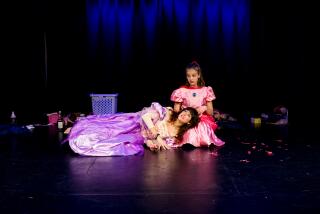A Scottish Renaissance?
- Share via
LONDON — “There’s a tremendous buoyancy and sense of expectation in Scotland at the moment,” director Gillies MacKinnon says. “We’re making a lot of films here now. But is there a Scottish school? Do the films have anything in common? A certain impudence, maybe. But I don’t think we know ourselves what the style is.”
Until last year, international audiences were only rarely exposed to films made in or about Scotland. It simply isn’t a country that had registered on the world’s cinematic consciousness.
Multi-Oscar winner “Braveheart” changed all that, of course, as did “Rob Roy,” another 1995 movie about a historical hero. Now there seems to be an entire, well, clan of movies dealing with Scottish matters.
The much-heralded “Trainspotting,” which opened last month, is, like “Shallow Grave,” its 1995 predecessor from the same creative team, set in Scotland’s capital, Edinburgh. And currently in production in Glasgow, Scotland’s largest city, is “Slab Boys,” writer-director John Byrne’s story of three young men working in the paint-mix room of a carpet factory. All these films are broadly contemporary and imbued with a cynical, antiheroic feel that places them 180 degrees apart from “Braveheart”; there’s not a glimpse of tartan to be seen.
You could say much the same about MacKinnon’s film “Small Faces,” which opens Friday. The action, seen through the eyes of 13-year-old Lex, takes place in 1968 in Glasgow and deals with rival youth gangs. While Glasgow is portrayed as a vibrant city, it’s also scary, bleak and lethally violent.
But it’s familiar terrain to MacKinnon and his brother Billy, who wrote “Small Faces” with him and produced the film; they grew up in Glasgow, and their father still lives there.
“In 1968, I was 20 years old and attending art school,” MacKinnon recalls. “Billy was 15. It’s a tough story, but it was never intended to be a social realist film about victims and hardship--because Glasgow was also a wonderful, exciting place to grow up.
“It was also an intellectually energizing time--there were hippies, riots in Paris, [a war in] Vietnam, Russian tanks rolling into Czechoslovakia. All those things were going on. It was good to be young then.”
Because of this, he and his brother decided the film should be mainly inhabited by young people; adults only appear in its margins. “We created this world in which the mother has no idea what happens to her kids when they go outside,” he says.
While there are echoes of the MacKinnon brothers’ lives in the film, it is not autobiographical. Of the three brothers depicted, Gillies concedes that he is “close” to Alan, the gently spoken art lover, and that there are elements of Billy in young Lex. But the third brother, Bobby, a gang member, is completely fictional.
The setting, though, is not. “There was a time--it lasted for seven or eight years--when the old slums in the middle of Glasgow were destroyed and families moved out to live on new housing estates,” MacKinnon recalls. “There was nothing to do out there, so young people came back into the city center and formed territorial gangs.”
He concedes that “Small Faces” is a story defined by its specific time and place but adds: “It was always intended to be universal. It could have happened in Italy or Chicago.” To help non-British audiences understand the film better, some re-voicing work was necessary (just as it was for “Trainspotting”). The young Scottish actors were told to enunciate more clearly to neutralize their thick brogues.
Though the film strains for mass acceptance, MacKinnon himself likes the fact that it is rooted in a world he knows. Much of his work has a Celtic background, having been shot either in Scotland or Ireland (like the 1992 film “The Playboys,” starring Albert Finney).
He made one foray into Hollywood, directing “A Simple Twist of Fate,” starring Steve Martin in 1994. But then he decided, as he puts it, “to get out of my trailer and make films in the cold and rain in Scotland.”
Why? “Because Hollywood is an easy place to get lost,” he says. “I did ‘Simple Twist of Fate,’ felt good about it but was faced with what to do next. A lot of Hollywood producers loved ‘The Playboys,’ so I went to America and got caught up in development deals for 2 1/2 years. But I want to make films, not just develop them.
“So I returned from the States after ‘Simple Twist of Fate’ with a tremendous desire to make this film with my brother--our film. And we made a film without stars, which was true to itself.”
MacKinnon says he and Billy could have made “Small Faces” on more than twice its eventual budget--which was around $2 million. “But that would have required the presence of a star American actress to play the boys’ mother and it just didn’t feel right.”
Galvanized by the experience, he then embarked on another film in the British Isles. “Trojan Eddie,” starring Richard Harris and Stephen Rea, is centered around a community of travelers in Ireland.
And MacKinnon’s next project takes him back to Scotland. He is currently casting “Regeneration,” based on an award-winning novel by Pat Barker about a psychiatric hospital for soldiers returning home traumatized by the trench warfare of World War I.
It seems, then, as if he’ll be staying on his home turf for a while. “I think so,” MacKinnon agrees. “I certainly wouldn’t rule out working again in America on a film I want to do and with people I want to make it with. But right now, I seem to be finding the best material in Britain.”
More to Read
Only good movies
Get the Indie Focus newsletter, Mark Olsen's weekly guide to the world of cinema.
You may occasionally receive promotional content from the Los Angeles Times.










